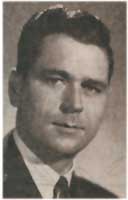
Philip S. Habermann
1927: Gilson Glasier, state law librarian, launches Bulletin of the State Bar of Wisconsin as quarterly magazine; serves as editor until 1948
1929: Minimum fee schedules first appear, until their demise in 1972. Fee schedules improved lawyers' ability to earn a living
1948: Philip S. Habermann is Bar's first executive director, assumes magazine editor duties until 1974
1949: Publication retitled Wisconsin Bar Bulletin; new format; color introduced to cover. Circulation at 2,500
1952: WBB moves from quarterly to bimonthly publication
1958: First photos of historical buildings, courthouses grace WBB cover
1958: Checklist series introduced, later evolves into State Bar CLE publication
1959: December WBB devoted to the economics of law practice
1974: Paul Jaeger becomes assistant editor/communications coordinator, assumes managing editor role until 1979
1974: James E. Hough hired as executive director, assumes editor title
1975: Arnold LeBell summarizes decisions for new Supreme Court Digest newsletter (later becomes regular WBB column)
1977: WBB published monthly; to save costs, three newsletters merge into magazine (WisBar Newsletter, Legislative Bulletin, and Supreme Court Digest)
1978: Steve Smay joins staff as executive director, serves as editor
1978: LeBell authors new Court of Appeals Digest column
1979: Joyce (Birrenkott) Hastings steps in as managing editor
1979: SBW president announces new 7" x 10" format as step to revitalize magazine; new design, formal cover photos, inside editorial graphics introduced
1981: WBB redesigned to 8.5" x 11" format to cut production costs, attract advertisers, upgrade design; editorial focuses on practical, Wisconsin-specific articles
1981: Communications Committee agrees to peer review submitted articles, improves quality of published articles. IPC becomes long-time print partner
1985: William Dyke produces WBB on audiocasette through 1999; Communications Committee initiates Hon. Charles Dunn Author Award to recognize writing excellence
1986: First full-time commissioned advertising sales person hired; June WBB focuses on women in the law
1987: LeBell retires; MU law professors Tom Hammer and Daniel Blinka now coauthor court digests
1989: Wisconsin Lawyer title introduced in January with graphic and editorial improvements
1989: Wisconsin Lawyer Directory becomes State Bar's official directory, published annually as a separate issue
1990: Since 1990, the WL has received nine awards for editorial achievement, and overall quality in writing, and design. Editorial and production staff celebrate the 1990 Awards of Publication Excellence for the WL (most improved magazine) and Directory. More than 800 entries were submitted
1992: Typesetting no longer outsourced; staff gain expertise to digitally produce magazine inhouse, ending tedious page paste-up; Board of Bar Examiners begins issuing CLE credit for writing substantive articles
1995: First editorial coverage of the Internet
1996: First use of stock art purchased via the Internet; improves access to low-cost quality photography
1997: WL goes online; nearly 27,000 magazine pages now viewed annually on WisBar
1998: Residet members perceive WL as the third most valuable Bar service; non-resident members rank the magazine highest of all services
1999: Updated WL design introduced in June is sixth major redesign; new typography and graphics; personal mentions column accepts photos
2000: George Brown named executive director, begins Inside the Bar column
2003: WL produced entirely in electronic format for delivery to printer; circulation is nearly 22,000. Resident members rank WL as second most valuable Bar service; nonresidents rank WL as highest, in 2003 member survey
Celebrating 75 Years - September 2003
